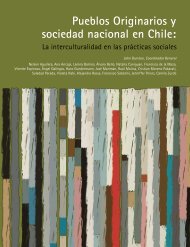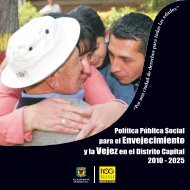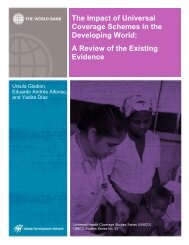11ZAQGM
11ZAQGM
11ZAQGM
You also want an ePaper? Increase the reach of your titles
YUMPU automatically turns print PDFs into web optimized ePapers that Google loves.
Introduction<br />
THE EQUATOR INITIATIVE: A PARTNERSHIP FOR RESILIENT COMMUNITIES<br />
The Equator Initiative brings together the United Nations, governments, civil society groups, businesses, and<br />
grassroots organizations to recognize and advance local sustainable development solutions for people, nature<br />
and resilient communities. The partnership arose from recognition that the greatest concentrations of both<br />
biodiversity and acute poverty coincide in equator belt countries, and the high potential for win-win outcomes<br />
where biological wealth could be effectively managed to create sustainable livelihoods for the world’s most<br />
vulnerable and economically marginalized populations. The high dependence of the rural poor on nature for their<br />
livelihoods means that biodiversity loss often exacerbates local poverty. But by the same token, action to sustain<br />
ecosystems and maintain or restore biodiversity can help stabilize and expand local resource-based economies<br />
and relieve poverty.<br />
The Equator Initiative aims to recognize the success of local and indigenous initiatives, create opportunities and<br />
platforms for the sharing of knowledge and good practice, inform policy to foster an enabling environment for<br />
local and indigenous community action, and develop the capacity of local and indigenous communities to scaleup<br />
their impact. The center of Equator Initiative programming is the Equator Prize, awarded biennially to recognize<br />
and advance local sustainable development solutions. As local and indigenous groups across the world chart a<br />
path towards sustainable development, the Equator Prize shines a spotlight on their efforts by honoring them on<br />
an international stage. The Equator Prize is unique for awarding group or community achievement, rather than<br />
that of individuals. Selection criteria include the following:<br />
• Impact: Initiatives that have improved community wellbeing and local livelihoods through sustainable natural<br />
resource management and/or environmental conservation of land based and/or marine resources.<br />
• Sustainability: Initiatives that can demonstrate enduring institutional, operational and financial sustainability<br />
over time.<br />
• Innovation and Transferability: Initiatives demonstrating new approaches that overcome prevailing constraints<br />
and offer knowledge, experience and lessons of potential relevance to other communities.<br />
• Leadership and Community Empowerment: Initiatives demonstrating leadership that has inspired action and<br />
change consistent with the vision of the Equator Initiative, including policy and/or institutional change, the<br />
empowerment of local people, and the community management of protected areas.<br />
• Empowerment of Women and Social Inclusion: Initiatives that promote the equality and empowerment of<br />
women and/or marginalized groups.<br />
• Resilience, Adaptability and Self-Sufficiency: Initiatives demonstrating adaptability to environmental,<br />
social and economic change, resilience in the face of external pressures, and improved capacity for local<br />
self-sufficiency.<br />
Community-Based Sustainable Land Management: Best Practices in Drylands from the Equator Initiative<br />
2






